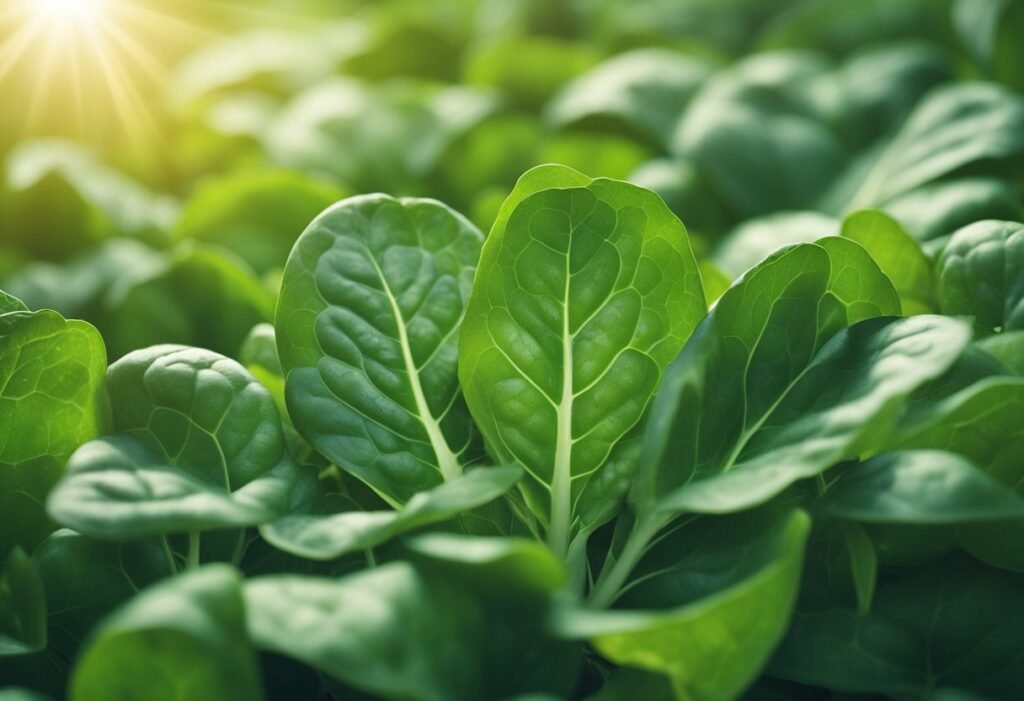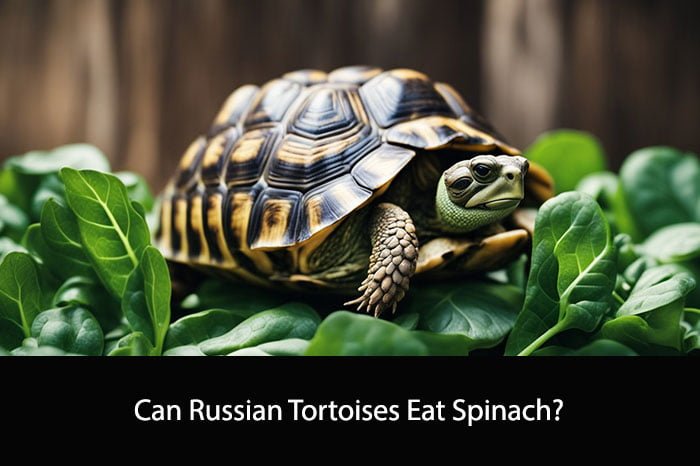Russian tortoises are a popular pet among reptile enthusiasts due to their small size and docile nature. As with any pet, it is important to provide them with a balanced and nutritious diet. One question that often arises is whether or not Russian tortoises can eat spinach.
Spinach is a leafy green vegetable that is commonly consumed by humans and is often recommended as a healthy food choice. However, when it comes to feeding spinach to Russian tortoises, there are some things to consider. While spinach is not toxic to these tortoises, it is not recommended as a regular part of their diet due to its high oxalic acid content. Oxalic acid can bind to calcium, which can lead to the formation of calcium oxalate stones in the tortoise’s kidneys.
Understanding Russian Tortoises’ Dietary Needs

Russian tortoises are herbivores, which means they primarily eat plants. However, not all plants are safe for them to consume. As responsible pet owners, it’s important to understand their dietary needs to ensure their optimal health and well-being.
Russian tortoises require a diet that is high in fiber and low in protein and fat. They also need a variety of leafy greens and vegetables to provide them with essential vitamins and minerals. Some safe options for their diet include:
- Collard greens
- Dandelion greens
- Endive
- Escarole
- Kale
- Mustard greens
- Turnip greens
While spinach is a common vegetable for humans, it should be avoided for Russian tortoises. Spinach contains high levels of oxalic acid, which can bind to calcium and prevent its absorption. This can lead to metabolic bone disease, a serious condition that can cause deformities and even death.
In addition to leafy greens, Russian tortoises can also eat a variety of vegetables such as carrots, bell peppers, and squash. However, fruits should be given in moderation due to their high sugar content.
It’s important to provide a varied diet for Russian tortoises to ensure they receive all the necessary nutrients. A diet that is too limited can lead to health problems, so be sure to rotate their food options regularly.
Overall, understanding the dietary needs of Russian tortoises is crucial to their health and well-being. By providing a balanced and varied diet, we can ensure that our pets live long and healthy lives.
Can Russian Tortoises Eat Spinach?

We often wonder if our pets can eat the same foods as we do. In the case of Russian tortoises, spinach is a popular vegetable that many owners like to feed them. However, before adding spinach to their diet, it’s important to consider whether or not it’s safe for them to eat.
While spinach is a nutritious vegetable for humans, it can be harmful to Russian tortoises if given in large amounts. Spinach contains high amounts of oxalates, which can bind to calcium and prevent it from being absorbed by the tortoise’s body. This can lead to calcium deficiency, which can cause metabolic bone disease.
It’s important to note that small amounts of spinach are generally okay for Russian tortoises to eat. However, it should not be a staple in their diet. It’s recommended to feed them spinach once a week or less, and to always provide a variety of other vegetables as well.
In summary, Russian tortoises can eat spinach in moderation, but it should not be a significant part of their diet. It’s important to provide a balanced and varied diet to ensure their health and well-being.
Nutritional Value of Spinach

Spinach is a leafy green vegetable that is a good source of vitamins and minerals. It is low in calories and high in nutrients, making it a healthy addition to any diet. Here are some of the nutritional benefits of spinach:
- Vitamin A: Spinach is high in vitamin A, which is important for healthy vision and immune function.
- Vitamin C: Spinach is also a good source of vitamin C, which is important for healthy skin and immune function.
- Iron: Spinach is a good source of iron, which is important for healthy blood and energy levels.
- Calcium: Spinach is also a good source of calcium, which is important for healthy bones and teeth.
- Fiber: Spinach is high in fiber, which can help promote healthy digestion and prevent constipation.
While spinach is a healthy food for humans, it is important to note that it may not be the best food for all animals. In particular, some animals, such as Russian tortoises, may not be able to digest spinach properly. It is important to consult with a veterinarian or animal nutritionist before feeding spinach or any other new food to your pet.
Potential Risks of Feeding Spinach to Russian Tortoises
While spinach is known to be a nutritious vegetable for humans, it may not be the best option for Russian tortoises. Spinach contains high levels of oxalates, which can bind with calcium and prevent it from being absorbed by the tortoise’s body. This can lead to the development of metabolic bone disease, which can cause deformities and other health problems.
In addition to the risk of calcium deficiency, spinach also contains high levels of nitrates. In high amounts, nitrates can be toxic to tortoises and can cause diarrhea, vomiting, and other digestive issues.
Furthermore, spinach contains a compound called beta-carotene, which can interfere with the absorption of vitamin A. Vitamin A is essential for a tortoise’s health, and a deficiency can lead to eye and respiratory problems.
While small amounts of spinach may not cause harm to a Russian tortoise, it is best to avoid feeding this vegetable regularly. Instead, it is recommended to offer a variety of leafy greens, such as collard greens, dandelion greens, and kale, to ensure a balanced and nutritious diet for your tortoise.
How to Safely Feed Spinach to Russian Tortoises
When it comes to feeding your Russian tortoise, spinach is a popular choice due to its nutritional value. However, there are some things to keep in mind to ensure that your tortoise stays healthy and safe.
Firstly, spinach contains high levels of oxalates, which can bind with calcium and prevent your tortoise from absorbing it. This can lead to metabolic bone disease, which is why it’s important to feed spinach in moderation. We recommend feeding spinach as a treat once or twice a week, and not as a staple food.
Secondly, it’s important to wash spinach thoroughly before feeding it to your tortoise. Spinach can often contain harmful bacteria and pesticides, which can be harmful to your tortoise’s health. Washing the spinach will help remove any harmful substances.
Lastly, it’s important to vary your tortoise’s diet and not rely solely on spinach. Tortoises require a balanced diet that includes a variety of different vegetables and fruits. Some other safe and nutritious options to feed your tortoise include kale, collard greens, dandelion greens, and turnip greens.
In summary, spinach can be a healthy and nutritious treat for your Russian tortoise, but it should be fed in moderation and washed thoroughly. Be sure to vary your tortoise’s diet and include a variety of different vegetables and fruits to ensure a balanced diet.
Alternatives to Spinach in Russian Tortoises’ Diet
We understand that spinach is a popular choice for feeding Russian tortoises, but it is not always the best option. Spinach contains high levels of oxalates that can bind calcium, leading to metabolic bone disease. Therefore, we recommend incorporating other leafy greens into their diet to provide a variety of nutrients.
Here are some alternatives to spinach that you can consider feeding your Russian tortoise:
- Collard Greens: These greens are high in calcium and low in oxalates, making them a great alternative to spinach. They also contain vitamins A and K, which are essential for a healthy tortoise.
- Endive: This leafy green is low in oxalates and high in fiber, making it a great addition to your tortoise’s diet. It also contains vitamin C, which can help boost their immune system.
- Kale: Kale is another great alternative to spinach. It is high in calcium and low in oxalates, making it a great source of nutrition for your tortoise. It also contains vitamins A and K, which are essential for their health.
- Mustard Greens: Mustard greens are low in oxalates and high in calcium, making them a great choice for your tortoise. They also contain vitamin C and beta-carotene, which can help boost their immune system.
- Turnip Greens: Turnip greens are another great alternative to spinach. They are low in oxalates and high in calcium, making them a great source of nutrition for your tortoise. They also contain vitamins A and K, which are essential for their health.
Remember, it is important to provide your Russian tortoise with a variety of leafy greens to ensure they are getting all the necessary nutrients. Rotate their diet to prevent boredom and ensure they are getting the right balance of nutrients.
Conclusion

In conclusion, Russian tortoises can eat spinach, but it should not be a significant part of their diet. Spinach has high levels of oxalates, which can bind to calcium and prevent its absorption by the tortoise’s body. This can lead to metabolic bone disease, which is a severe health condition that can affect the tortoise’s quality of life.
We recommend feeding spinach to Russian tortoises in moderation and only as an occasional treat. It should not be the primary source of their diet. Instead, we suggest feeding them a variety of leafy greens, vegetables, and fruits to ensure they receive a balanced and nutritious diet.
It is essential to remember that every tortoise is different, and their dietary needs may vary. We recommend consulting with a veterinarian or a reptile nutritionist to develop a personalized diet plan for your Russian tortoise. By providing them with a balanced and nutritious diet, you can help ensure they live a healthy and happy life.
Frequently Asked Questions
What leafy greens can a Russian tortoise eat?
Russian tortoises are herbivores, and they can eat a variety of leafy greens. Some of the safe options include kale, collard greens, dandelion greens, mustard greens, and turnip greens. Spinach should be avoided due to its high oxalate content, which can bind to calcium and prevent its absorption.
What fruit is safe for Russian tortoises to eat?
Fruit should be given sparingly as it is high in sugar. Some safe options include apples, pears, and berries. However, fruits high in oxalates such as strawberries and raspberries should be avoided.
What should be included in a Russian tortoise’s diet?
A balanced diet for a Russian tortoise should consist of a variety of leafy greens, vegetables, and occasional fruit. Calcium and vitamin D3 supplements should also be provided.
Do Russian tortoises have a tendency to bite?
Russian tortoises are not known to be aggressive and rarely bite. However, they may bite if they feel threatened or provoked.
What should be included in a Russian tortoise’s habitat?
Russian tortoises need a spacious enclosure with a basking area, hiding spots, and a substrate that allows for burrowing. The enclosure should also have a UVB light source and a heat lamp to provide proper lighting and temperature.
What foods should be avoided when feeding a Russian tortoise?
Foods high in oxalates, such as spinach, rhubarb, and beet greens, should be avoided. Also, avoid feeding high-fat and high-protein foods such as cheese and meat as they can cause health problems for tortoises.





